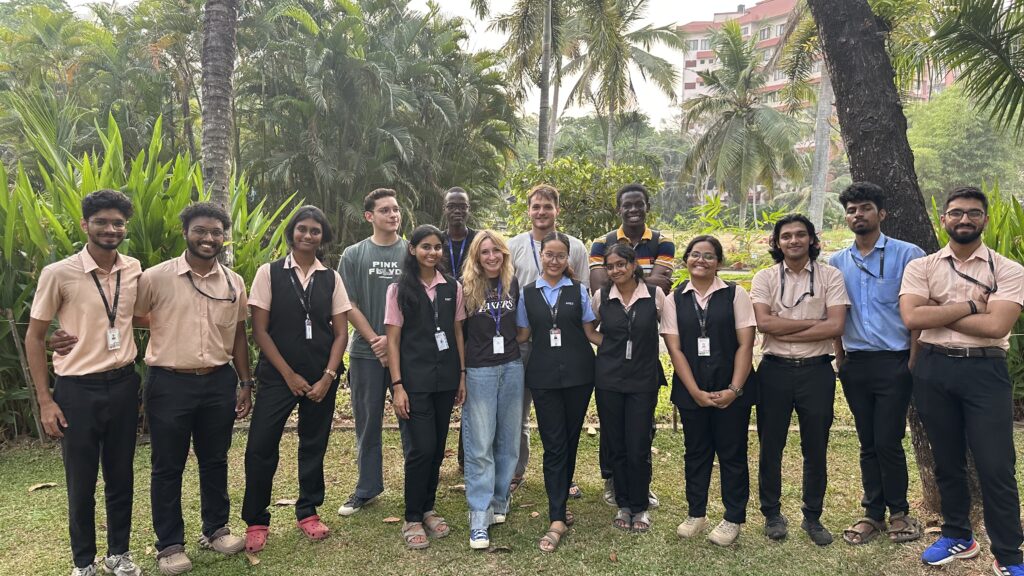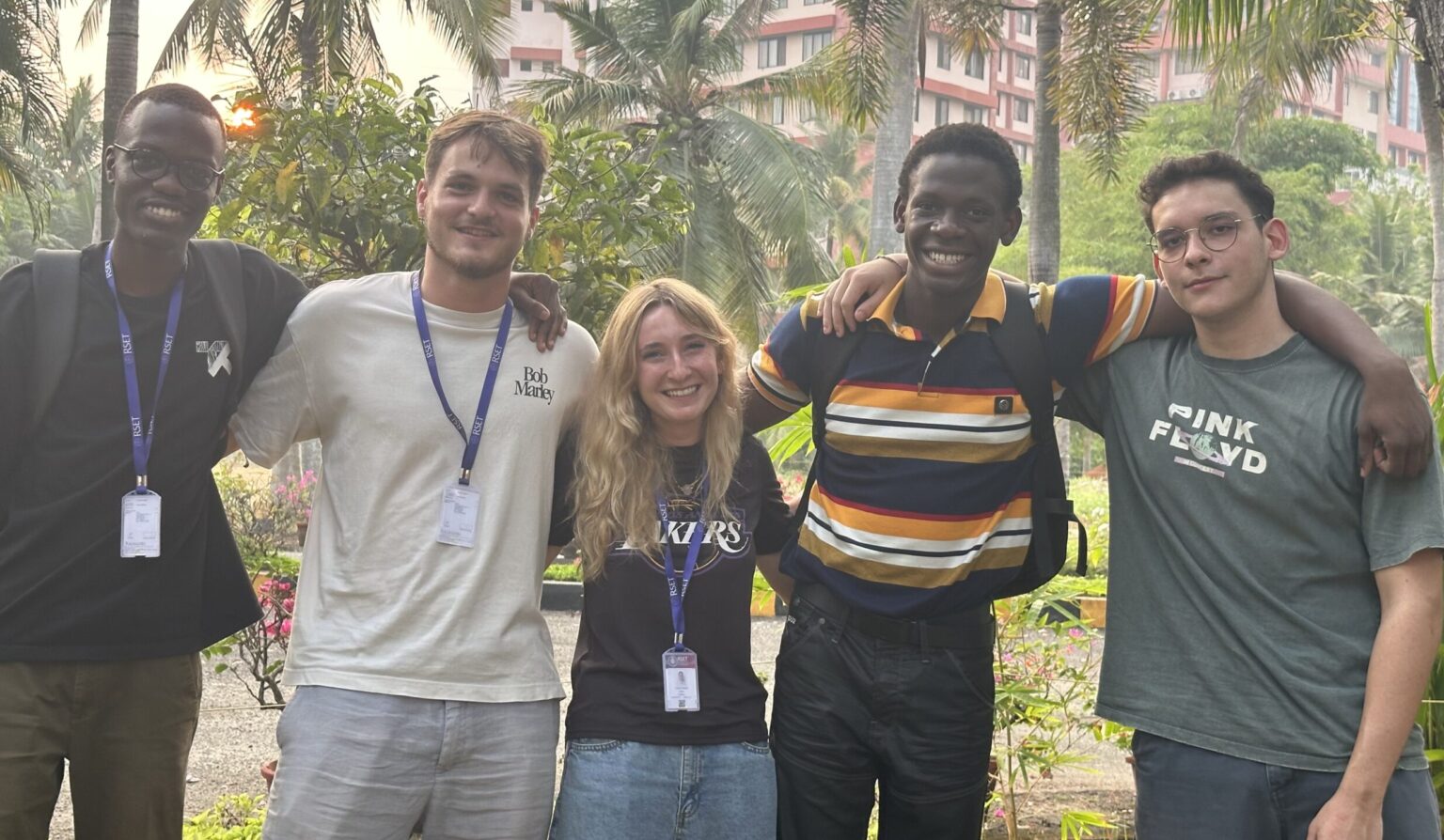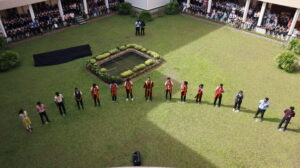Moving to a new country is much like stepping into organized mayhem—there is certainly a method to the madness, but one wouldn’t know it unless they stepped into it. For exchange students, every moment is a blend of excitement, adaptation, and the occasional curveball—in practice, it is much more than merely occasional, I’d say.
As I sat down to interview Louise and Julien, two French exchange students at Rajagiri, I could immediately sense that their time in India had been nothing short of a whirlwind. They described their experience as a mix of discovery, delightful confusions, and an ongoing battle with their spice tolerance. One of the biggest challenges they faced was adjusting to life without the comforts of home. While Louise embraced the change, Julien initially struggled with loneliness. But as it turns out, making friends in India is significantly easier than understanding the unwritten rules of crossing the street—also a game of lower stakes.
As our conversation progressed, it became clear that language itself wasn’t much of a barrier, but accents were a whole different story. Both of them often relied heavily on hand gestures and creative expressions, becoming makeshift experts in sign language.
I was particularly curious about the cultural shocks they faced. Louise was baffled by hostel curfews, a concept unheard of in France. Julien, meanwhile, was fascinated by India’s cultural and religious diversity—so many languages, traditions, and belief systems thriving together in harmony. He observed how faith is so openly expressed in India, a stark contrast to the private nature of religion in France, despite his skepticism. And then, of course, there was the traffic. Both of them described it as a supernatural, bizarre phenomenon that even native Indians dread. It had rules, but they seemed more like suggestions that everyone interpreted in their own way—yet somehow, it worked. Sometimes, it worked all the time.
Food, as expected, was another major adjustment. Both initially found it overwhelmingly spicy but admitted that it grew on them. They were pleasantly surprised by the sheer variety of flavors and textures. Eating with hands turned out to be an unexpectedly satisfying experience. Louise enjoyed it, and Julien went as far as to say that if etiquette allows it, he is prepared to revolutionize the dining culture back home.
I asked them about their expectations before arriving in India. Louise’s family, unsurprisingly, had a plethora of concerns. Julien, on the other hand, had come half-prepared for an insect-induced catastrophe. Instead, they found a country that was vibrant, welcoming, and much more nuanced than any media portrayal.
Beyond the initial surprises, what truly stood out to them was India’s deep-rooted sense of community. Louise particularly admired the way guests were treated with such reverence in Indian culture—Atithi Devo Bhava (the guest is god) was always more than just a saying; it was a way of life. She was also moved by how strangers would stop everything to offer help, something she hopes to bring back to France.
One of the more unexpected realizations they shared with me was how French people are often perceived abroad. The stereotypes of the French as “romantics” and “philosophers” followed them even in India, much to their amusement. Louise took it in stride, while Julien found himself frequently explaining that not every French person spends their time contemplating the meaning of life over a glass of wine.
When I asked them about Rajagiri, their faces lit up. Louise adored the constant buzz of activities—music, open mics, and of course, the legendary Biju Sir. Julien loved how quickly he connected with people, forming friendships in ways he hadn’t expected. The campus, they told me, felt alive, like there was always something happening.
Their time at Rajagiri also reshaped the way they viewed education. The hierarchical structure in Indian education was an adjustment because teachers in France are more casual and approachable, while in India, there is a clear sense of authority. Julien found this structure beneficial in maintaining discipline and success.

One of the most exciting parts of their academic experience has been the Garden Library project. They aim to make it cooler and more ecological, incorporating terracotta structures to regulate temperature naturally. The first batch of exchange students had laid the foundation, and now this year’s group is working on energy supply, water systems, and designing the furniture and interiors. Their dream is to create a space that not only promotes sustainability but also acts as a space for creativity and learning.
As I wrapped up the interview, I asked them how they felt about leaving. It was clear from what they said that they didn’t just arrive in India—they stepped into a museum of culture and chaos. As they prepare to leave behind their work on the Garden Library and return to France, they realize that a part of them will always belong here—in the crowded streets, in the spicy curries, and in the warmth of strangers who felt like family. And of course, they’ll take home enough masalas to last a lifetime—both in their kitchens and in their hearts.
When sitting down with Charly and Gloire the first thing that struck me was their hospitality, in spite of the fact that it was almost certainly supposed to be the other way around. The bench was regrettably a two seater, which, if you do the math, is a number far lower than the required capacity of three. When we finally got settled and commenced the interview, I quickly realized I had far overestimated my knowledge of the French language. However they, once again, were more than willing to accommodate even this shortcoming.
At this point I must admit my curiosity had gotten the better of me. I began by enquiring about their places of origin. Charly spoke quite fondly about his hometown in Toulouse located in the South of France, praising its pleasant weather, the Mediterranean coastline, and how the mountains are just a quick car ride away. He expressed his love for French cuisine, which Indians normally acquainted only with croissants, particularly charcuterie – consisting of a delectable spread of dried meats like salami and bologna, which he deeply misses. While discussing Paris, known as a popular destination for a romantic getaway, he admitted it’s not as nice to live in as perceived internationally due to the constant hustle-bustle of tourists and the fast paced lifestyle.
On the other hand, Gloire wove a beautiful tapestry describing the Democratic Republic Of Congo’s natural beauty, emphasising it’s rich vegetation and diverse culture prevalent in the west of the great nation. He fondly spoke about Ugali, a corn meal made from maize, highlighting its versatility in being paired with chicken, fish or any side dish of one’s choice. When it came to Indian food, he admitted he wasn’t a fan of spicy dishes but enjoyed Kerala’s curry and chicken masala.
Sports were undeniably a passionate subject. It had been ages since I’d had the chance to dive into an in-depth discussion about mixed martial arts—a domain I had long been intensely invested in. The moment Charly and I started talking, we launched into a spirited debate about our favorite fighters, particularly those of French and Canadian descent. We marveled at the ferocity of Benoit St. Denis and, in what I fully admit was a biased take, hailed Georges St-Pierre as the greatest fighter to ever set foot in the Octagon—a veritable tour-de-force who had vanquished every challenger who dared to stand before him.
Our conversation then expanded to the almost otherworldly talent of Victor Wembenyama known affectionately (and perhaps luckily) as Wemby and the legendary career of another San Antonio Spur Tony Parker. From there, we delved into an impassioned discussion about Rugby 7s and French football, each topic fueling our excitement as we exchanged insights and opinions.
Despite their differences, both of them shared a deep curiosity about Indian culture and have admirably adapted to their novel surroundings. This conversation was a testament to the beauty of international perspectives, a reminder that the world is a vast mosaic of cultures, traditions and ways of life. It reinforced the idea that our differences—whether in food, lifestyle, or philosophy are not barriers but rather invitations to explore, understand, and appreciate. Every exchange of ideas became an opportunity to step into another person’s world, to see life from their shoes (both of whose were far too massive for my severely undersized feet), and to expand our own understanding of what it means to be human.
In my opinion, one of the things that unite both Keralites and Europeans is football. Watching Kerala Blasters FC play in their home stadium was truly a sight to behold for César, another foreign exchange student from France. The Kerala Blasters boast one of the biggest fan followings in the world. Even though the players weren’t up to the European standard that he had grown accustomed to in the French Ligue 1, he says that the atmosphere around the stadium—the large turnout of the crowds to watch the match, the yellow wave of passionate fans screaming and their undying support for their team—was reminiscent of home.
César and Néhémie—who hails from The Democratic Republic of Congo—are also students under the General Engineering Program. Their schedule is accommodating, allowing them free time to engage in extracurricular activities and leisure, like playing football with the locals. As part of their degree, their project was to make an autonomous boat, which had both coding and mechanical aspects to it. It was a joint venture between the second and third years, and the faculty provided appropriate support to help them make it. “It didn’t really matter how we reached the result, we just had to have a floating boat in the end”, César said with a laugh.
Asking them about something they found different in India compared to their home countries led to a long conversation on how much they view Indian food. The milder palate of French cuisine—cheese, bread, and eggs—was much more comfortable and infinitely less spicy than Indian food. They found it appalling how Indians could eat spicy things in the morning, the sweating and the discomfort that follows is certainly not worth it, right?
Néhémie’s love for rice drew a big, bold line at any type of Indian rice. No variety of it could bring him to enjoy it. His disdain left him questioning everything he thought he knew about it—how could it be so different? And this is without any spices? His bewilderment had us all roaring with laughter. César, on the other hand, is just getting by. “Indian food is certainly not my cup of tea, but I don’t mind it,” he says.
Curious and welcoming were the words César used to describe the people he had encountered in India. “They want to show how great India is, and they genuinely care about you, which is very different from how it is in France, where no one really cares about anybody else”, Néhémie nodded in agreement. The only problem they found was the language barrier. Though a lot of the Indians they met spoke English, the accent was hard to understand. Some of them were more fluent in Malayalam, and communicating with them was a task.
Though the food isn’t to his palate—nothing compares to the rice in Congo—their experiences in Kerala are remembered as joyful. Being in a loud, bustling country which is different in every way—from the food, to the people, language, and even traffic—can be overwhelming for any twenty-one year old. Still, they love the hospitality of the Indian people and rather enjoy life here, easily balancing academics and fun.
These conversations with the foreign exchange students gave us a wealth of knowledge, somehow through the experiences of others, a richness that can only be uncovered through genuine curiosity and open dialogue. It also highlighted a willingness to ask, and consequently a willingness to learn, essential qualities in our vastly diverse world. At its core this conversation was a powerful reminder that learning is far from limited to any classroom. Whether one hails from Toulouse, Karnataka or Kinshasa, there is always something to gain from one another, new ideas to absorb, new connections to make and new ways to appreciate the diversity that makes our world extraordinary.






